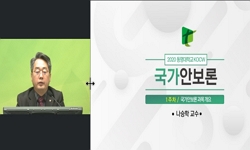과학기술의 발전은 군사력에도 많은 영향을 미친다. ICT(정보통신기술), BT(바이오 기술), NT(나노 기술) 간의 융합과 확장은 단순히 기술들 간의 접목이나 인간이 일상에서 기술을 이용하는데...
http://chineseinput.net/에서 pinyin(병음)방식으로 중국어를 변환할 수 있습니다.
변환된 중국어를 복사하여 사용하시면 됩니다.
- 中文 을 입력하시려면 zhongwen을 입력하시고 space를누르시면됩니다.
- 北京 을 입력하시려면 beijing을 입력하시고 space를 누르시면 됩니다.
https://www.riss.kr/link?id=A107763480
- 저자
- 발행기관
- 학술지명
- 권호사항
-
발행연도
2021
-
작성언어
Korean
-
주제어
인간 증강 ; 윤리 ; 군사적 목적 ; 군인 ; 기본권 ; 인권 ; 국가 안보 ; human enhancement ; ethics ; military purpose ; soldier ; basic rights ; fundamental rights ; human rights ; national security
-
등재정보
KCI등재
-
자료형태
학술저널
-
수록면
27-64(38쪽)
-
KCI 피인용횟수
0
- 제공처
- 소장기관
-
0
상세조회 -
0
다운로드
부가정보
국문 초록 (Abstract)
첨단 기술을 군인의 인체에 적용하는 군사적 목적의 인간 증강은 윤리적 문제와 국가로부터 보호받아야 할 근본적 권리로서의 기본권적 논의를 야기한다. 본고는 해외의 경우 군대의 첨단 과학의 혁신 적용으로 군가 안보 분야의 인간 증강에 관한 윤리적 · 법적 문제는 중요한 문제로 인식되어왔으나 아직 우리나라에서 논의된 바 없는 군사적 목적의 인간 증강에 관한 헌법적 쟁점을 살펴본다. 민간에서 개발해왔던 기술들을 국가 안보와 군사력 증진에도 활용함으로써 발생하는 윤리적 쟁점을 토대로 기본권과 기본적 인권 측면에서의 논점을 고찰한다.
과학기술의 발전은 군사력에도 많은 영향을 미친다. ICT(정보통신기술), BT(바이오 기술), NT(나노 기술) 간의 융합과 확장은 단순히 기술들 간의 접목이나 인간이 일상에서 기술을 이용하는데서 그치지 않는다. 이 기술을 통해서 신체의 물리성과 정서적 감성을 확장하고 인지역량을 향상하는 인간 증강기술은 군인들의 전투력 향상하는 국가 안보 분야에도 활용된다. 인간 증강기술은 사회 곳곳에 적용되고 있는 4차 산업혁명의 파고와 함께 미래의 국방력의 하나로 각광을 받으면서, 국가 안보와 군사력을 증진시킬 수 있는 유용한 도구로 전망되고 있다. 생존율과 회복률을 증대시키는 유전자 치료, PTSD(Post-traumatic Stress Disorder; 외상 후 스트레스 장애) 치료부터 인간의 근육을 증강시키는 육체적 능력 증강기술, 집중력과 기억력 등의 인지 능력향상 기술, 외골격 웨어러블 로봇을 통하여 장비 운반과 전투력 향상에 도움을 주는 증강 기술, 인간의 뇌와 기계를 연결하여 군사적 무기에 활용하는 기술 등으로 미국, 독일, 호주, 캐나다, 중국, 러시아, 영국, 인도, 이스라엘 등 많은 나라에서 신경과학기술을 국가 안보 분야에 적용하는 연구 개발을 진행중이다.
첨단 기술을 군인의 인체에 적용하는 군사적 목적의 인간 증강은 윤리적 문제와 국가로부터 보호받아야 할 근본적 권리로서의 기본권적 논의를 야기한다. 본고는 해외의 경우 군대의 첨단 과학의 혁신 적용으로 군가 안보 분야의 인간 증강에 관한 윤리적 · 법적 문제는 중요한 문제로 인식되어왔으나 아직 우리나라에서 논의된 바 없는 군사적 목적의 인간 증강에 관한 헌법적 쟁점을 살펴본다. 민간에서 개발해왔던 기술들을 국가 안보와 군사력 증진에도 활용함으로써 발생하는 윤리적 쟁점을 토대로 기본권과 기본적 인권 측면에서의 논점을 고찰한다.
다국어 초록 (Multilingual Abstract)
Using human enhancement technology for military purposes, which apply the cutting-edge technology to soldiers, creates ethical and legal issues as a fundamental right to be protected from the state. This paper deals with constitutional issues on human enhancement for military purposes. Although this is an important issue in the field of military security, that have not yet been discussed in Korea. Based on ethical issues arising from the use of technologies developed by the private sector to enhance national security and military power, this paper review the issues that need to be examined in terms of basic rights and human rights.
The development of science and technology has a lot of influence on military power. Convergence and expansion between ICT (Information and Communication Technology), BT (Bio Technology), and NT (Nano Technology) technologies are not just grafting betw...
The development of science and technology has a lot of influence on military power. Convergence and expansion between ICT (Information and Communication Technology), BT (Bio Technology), and NT (Nano Technology) technologies are not just grafting between technologies, or humans using this convergence technology in their daily lives. The so-called “human enhancement,” which expands the physical and emotional sensibility of the body and improves the human cognitive capability, is also used in the field of national security that improves the combat power of soldiers. Human enhancement technology is expected to be a useful tool to enhance national security and military power, drawing attention as one of the future defense forces along with the wave of the fourth industrial revolution applied throughout society. Human enhancement technology being developed overseas such as the United States, Germany, Canada, China, Russia, Israel is as follows; Genetic therapy that increases survival rate and recovery rate, physical ability to augment human muscle, PTSD (Post-traumatic Stress Disorder) treatment, increased cognitive skills such as concentration and memory, human enhancement technology that connects human brains and machines to military weapons, etc.
Using human enhancement technology for military purposes, which apply the cutting-edge technology to soldiers, creates ethical and legal issues as a fundamental right to be protected from the state. This paper deals with constitutional issues on human enhancement for military purposes. Although this is an important issue in the field of military security, that have not yet been discussed in Korea. Based on ethical issues arising from the use of technologies developed by the private sector to enhance national security and military power, this paper review the issues that need to be examined in terms of basic rights and human rights.
목차 (Table of Contents)
- Ⅰ. 서론
- Ⅱ. 군사적 목적의 인간 증강의 시도와 개발 현황
- Ⅲ. 군사적 목적의 인간 증강에 관한 윤리적 · 법적 논점
- Ⅳ. 군사적 목적의 인간 증강과 기본권
- Ⅴ. 결론
- Ⅰ. 서론
- Ⅱ. 군사적 목적의 인간 증강의 시도와 개발 현황
- Ⅲ. 군사적 목적의 인간 증강에 관한 윤리적 · 법적 논점
- Ⅳ. 군사적 목적의 인간 증강과 기본권
- Ⅴ. 결론
- 참고문헌
- 국문요약
- Abstract
참고문헌 (Reference)
1 정선화, "휴먼증강 기술 주요 동향과 R&D 시사점" ETRI 한국전자통신연구원 미래전략연구소 2019
2 엄주희, "코로나 통제에 따른 기본권의 제한과 국가의 역할" 법과정책연구원 26 (26): 51-73, 2020
3 엄주희, "인공지능 의료와 법제" 한국의료법학회 28 (28): 53-77, 2020
4 김철수, "인간의 권리-인권사상⋅국내인권법⋅국제인권법" 산지니 2021
5 김대순, "유럽인권재판소의 “판단의 재량” 독트린:법의 지배에 대한 위협인가?" 대한국제법학회 58 (58): 11-43, 2013
6 박상민, "우리나라 군 연구기관의 기관생명윤리위원회 운영 현황과 군인 연구대상자 추가 보호 방안" 가톨릭생명윤리연구소 10 (10): 39-70, 2020
7 신희건, "신경향상 기술이 제기하는 난제-신경법학의 기반 연구를위한 윤리적 쟁점 검토" 3 (3): 2020
8 이부하, "생명에 대한 기본권보호의무와 과소보호금지원칙" 법학연구소 (62) : 1-21, 2014
9 엄주희, "보건의료법학과 헌법의 교차점 ― 보건의료 규범에 관한 헌법적 고찰 ―" 공익인권법센터 (24) : 167-203, 2020
10 임창환, "바이오닉맨" MID(엠아이디) 2018
1 정선화, "휴먼증강 기술 주요 동향과 R&D 시사점" ETRI 한국전자통신연구원 미래전략연구소 2019
2 엄주희, "코로나 통제에 따른 기본권의 제한과 국가의 역할" 법과정책연구원 26 (26): 51-73, 2020
3 엄주희, "인공지능 의료와 법제" 한국의료법학회 28 (28): 53-77, 2020
4 김철수, "인간의 권리-인권사상⋅국내인권법⋅국제인권법" 산지니 2021
5 김대순, "유럽인권재판소의 “판단의 재량” 독트린:법의 지배에 대한 위협인가?" 대한국제법학회 58 (58): 11-43, 2013
6 박상민, "우리나라 군 연구기관의 기관생명윤리위원회 운영 현황과 군인 연구대상자 추가 보호 방안" 가톨릭생명윤리연구소 10 (10): 39-70, 2020
7 신희건, "신경향상 기술이 제기하는 난제-신경법학의 기반 연구를위한 윤리적 쟁점 검토" 3 (3): 2020
8 이부하, "생명에 대한 기본권보호의무와 과소보호금지원칙" 법학연구소 (62) : 1-21, 2014
9 엄주희, "보건의료법학과 헌법의 교차점 ― 보건의료 규범에 관한 헌법적 고찰 ―" 공익인권법센터 (24) : 167-203, 2020
10 임창환, "바이오닉맨" MID(엠아이디) 2018
11 엄주희, "미성년자 연명의료 결정에 관한 소고: 미국에서의 논의를 중심으로" 법학연구소 41 : 121-144, 2018
12 김종열, "미래 무기체계와 군사과학기술 발전추세 분석: 미국을 중심으로" (사) 한국전략문제연구소 25 (25): 75-104, 2018
13 박준혁, "미국의 제3차 상쇄전략 : 추진동향, 한반도 영향전망과 적용방안" 세종연구소 23 (23): 35-66, 2017
14 엄주희, "뇌신경윤리에 관한 법제 연구" 2018
15 엄주희, "뇌신경과학 연구에서 연구대상자 보호: 인격주의 생명윤리적 고찰" 가톨릭생명윤리연구소 9 (9): 83-115, 2019
16 양소연, "군인의 표현의 자유를 제한하는 법률에 대한 위헌심사 — 헌재 2018. 4. 26. 2016헌마611 외 2개 결정에 대한 평석을 겸하여 —" (사)한국언론법학회 18 (18): 139-173, 2019
17 송기춘, "군인의 인권보장을 위한 기본원칙과 방향" 민주주의법학연구회 (42) : 233-269, 2010
18 이광원, "군인의 기본권제한과 사법심사 - 판례평석: 헌법재판소 2010.10.28.선고2008헌마638결정 -" 법학연구원 (36) : 273-302, 2011
19 이재희, "군내 불온서적 금지에 대한 헌법재판소 결정과 불온서적 금지 헌법소원심판청구로 인한 징계 취소 대법원 판결에 대한 검토" 헌법재판연구원 5 (5): 221-265, 2018
20 Glenn Cohen, "This Is Your Brain on Human Rights : Moral Enhancement and Human Rights" 9 (9): 1-41, 2015
21 Parag Khanna, "The Pleasure and Danger of Augmented Reality"
22 Peter Rowe, "The Impact of Human Rights Law and Armed Forces" Cambridge University Press 2006
23 Michael N. Tennison, "Security threat versus aggregated truths: Ethical issues in the use of neuroscience and neurotechnology for national secutity" Neuroethics -Anticipating the future , Oxford University Press 531-553, 2017
24 George J. Annas, "Protecting Soldiers from Friendly Fire : The Consent Requirement for Using Investigational Drugs and Vaccines in Combat" 24 : 245-, 1998
25 Katie Drummond, "Prosthetics Breakthrough Might Fuse Nerves with Fake Limbs"
26 Naval Strike and Air Warfare Center, "NAVMED P-6410, Performance Maintenance during Continuous Flight Operations: A Guide for Flight Surgeons 21 (NAVMED P-6410)" Naval Strike and Air Warfare Center 2000
27 엄주희, "IALMH 제36회 국제 학술대회 참관기" BRIC 2019
28 Susan W. Brenner, "Humans and Humans : Technological Enhancement and Criminal Responsibility" 19 (19): 215-285, 2013
29 Maxwell J. Mehlman, "Human Subjects Protections in Biomedical Enhancement Research: Assessing Risk and Benefit and Obtaining Informed Consent" 36 (36): 546-559, 2008
30 Jo Bird, "Human Rights and the Military: The Chemical Soldier" 30 : 81-85, 2005
31 Efthimios Parasidis, "Human Enhancement and Experimental Research in the Military" 44 (44): 1117-1132, 2012
32 Gerald Walter, "Handbook of neuroethics (Ⅲ)" Springer Reference 2015
33 Fritz Allhoff, "Ethics of Human Enhancement: 25 Questions & Answers" 4 (4): 1-39, 2010
34 Catherine L. Annas, "Enhancing the Fighting Force:Medical Research on American Soldiers" 25 : 2009
35 Patrick Lin, "Enhanced Warfighters:Risk, Ethics and Policy"
36 Maxwell J. Mehlman, "Enhanced Warfighters: Risk, Ethics, and Policy" 2013
37 "DARPA-initiated augmented cognition program.National Research Council (US) Committee on opportunities in Neuroscience for future army applications, opportunities in Neuroscience for future army applications"
38 "Cyborg Soldier 2050: Human/Machine Fusion and the Implications for the Future of the DOD"
39 Peter Emanuel, "Cyborg Soldier 2050: Human/ Machine Fusion and the Implications for the Future of the DoD" CCDC 2019
40 David Talbot, "An Artificial Hand with Real Feelings, MIT TECHNOLOGY REVIEW"
41 한국과학기술기획평가원, "<디지털 휴먼증강> 미래 유망 기술․서비스" KISTEP 2020
42 엄주희, "4차 산업혁명 시대의 과학기술 발전에 따른 공법적 과제 - 신경과학 발전과 기본권 보호의 지형 -" 연세법학회 (34) : 119-139, 2019
43 한국연구재단, "2017 미래유망기술 프로그램 – 신체증강휴먼" 한국연구재단국책연구본부 2017
동일학술지(권/호) 다른 논문
-
- 동아대학교 법학연구소
- 장병주(JANG, Byeong-Ju)
- 2021
- KCI등재
-
헌법적 형사소송의 관점에서 바라본 동의에 의한 수색에 대한 소고
- 동아대학교 법학연구소
- 송진경(Song, Jin-Kyung)
- 2021
- KCI등재
-
- 동아대학교 법학연구소
- 배정범(BAE, Jeong Bom)
- 2021
- KCI등재
-
- 동아대학교 법학연구소
- 김성원(Kim, Sung-Won)
- 2021
- KCI등재
분석정보
인용정보 인용지수 설명보기
학술지 이력
| 연월일 | 이력구분 | 이력상세 | 등재구분 |
|---|---|---|---|
| 2026 | 평가예정 | 재인증평가 신청대상 (재인증) | |
| 2020-04-01 | 학회명변경 | 영문명 : Institute for the Study of Law Dong-A University -> The Institute for Legal Studies Dong-A University |  |
| 2020-04-01 | 학술지명변경 | 외국어명 : 미등록 -> DONG-A LAW REVIEW |  |
| 2020-01-01 | 평가 | 등재학술지 유지 (재인증) |  |
| 2017-01-01 | 평가 | 등재학술지 유지 (계속평가) |  |
| 2013-01-01 | 평가 | 등재학술지 유지 (등재유지) |  |
| 2010-01-01 | 평가 | 등재학술지 선정 (등재후보2차) |  |
| 2009-01-01 | 평가 | 등재후보 1차 PASS (등재후보1차) |  |
| 2007-01-01 | 평가 | 등재후보학술지 선정 (신규평가) |  |
학술지 인용정보
| 기준연도 | WOS-KCI 통합IF(2년) | KCIF(2년) | KCIF(3년) |
|---|---|---|---|
| 2016 | 0.76 | 0.76 | 0.73 |
| KCIF(4년) | KCIF(5년) | 중심성지수(3년) | 즉시성지수 |
| 0.68 | 0.67 | 0.842 | 0.16 |




 KCI
KCI DBpia
DBpia







